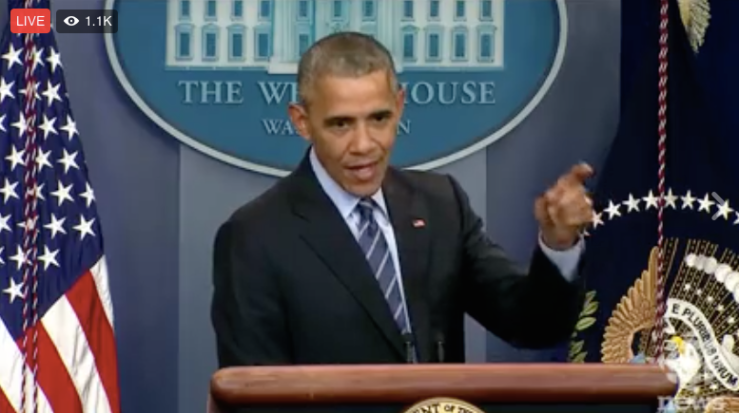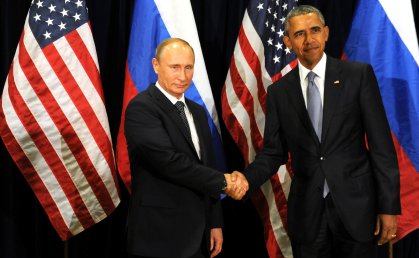
“The Russians can’t change us or politically weaken us… they can impact us if we lose track of who we are.”
Today, Barack Obama met with the press for a year’s end news conference. Being what may be his final conference, it was chock full of discussion on the relevant topics: Syria, Russia and especially doubt on the electoral system. A moment near the middle interrupted the procession, with one of the offscreen attendees becoming sick and in need of a doctor. Obama simply, casually, called for on site medical staff. The camera panned slowly back, showing the heads of the room, all pointed to the right. It was an oddly apt metaphor for the future, and for the casual simplicity of a government imposed medical coverage.
Obama met the crowd with a tired smile. He looked exhausted – physically ready for a holiday, yet trepidatious about the future of his country. He repeated again and again the need for a bipartisan view on government and politics, and recognizing the difference between American values and constructed, polarized views. He mentioned the incredible reality that 37 percent of republican voters approve of Putin(based on one survey), saying that this reality would cause Reagan to would roll over in his grave. He claimed that this happened because everything that’s said lately is seen through a specific, polarizing lens: in Republican terms, how does whatever fact help us or hurt us relative to democrats or President Obama?
 He said it again and again: “Our vulnerability to Russia or any other foreign power is directly related to how divided… our political process is. That’s the thing that makes us vulnerable.”
He said it again and again: “Our vulnerability to Russia or any other foreign power is directly related to how divided… our political process is. That’s the thing that makes us vulnerable.”
It’s an immediately sobering reflection on an already sobered country(appropriately, Trump himself avoids alcohol, choosing soda instead). Discussing anything in political relations right now comes back to Russia, time and again. When speaking of Aleppo and the United States’ inability to do anything without focussing more money and effort than congress is willing to approve, when speaking about the results of the election… everything came back to Russia.
Obama iterated again and again the necessity of a consistent journalistic narrative. The facts are there. Information is made available. The issue is when that information is constantly reassessed to fit in with a newer political narrative. Issues with Russian computer access to the DNC were public knowledge during the extent of the campaign, but this has been constantly reassessed as ammunition one way or another by each side of the conversation. There’s only a certain extent to which we can realize reality as subjective.
It’s difficult to genuinely consider the investigation of tampering with the election to be a bipartisan issue, despite the fact that that’s inherently what it is. While one has to recognize the Democratic party’s personal stake in the discussion, especially after losing the election, if the electoral system has been compromised then it has become something that affects any party and any result and needs to be assessed, even if that’s by the party that benefits from it.
Obama’s comments on Trump were general, attempting to reconcile the necessary ideal of a unified America. How things have gone has been important, but the future of America is what needs to be considered. It’s up to the people of America. But Obama stressed the necessity in trusting in essential pieces of the American administration, especially in the Intelligence divisions. “Unless the american people genuinely think that the professionals in the CIA, FBI… are less trustworthy than the Russians, then people should pay attention to what our intelligence agencies say.”
But Obama dissuaded claims that the issue is as complicated and grave as all that. “The votes that were cast were counted appropriately; we have not seen evidence of machines being tampered with,” he said.
The Facebook comments that littered the side of the feed cast dispersions on the future, actively playing against the narrative that Obama presented. Whether comments about how Trump would ruin America or about how ‘new evidence’ on Obama’s birth certificate clearly evidenced he was not a genuine American, the discussion, even when in vocal support, played against the prerogative the president was trying so hard to convey, continuously hammering in the hyper-partisan state of the union.

“Mele Kalikimaka,” Obama said, exiting the stage. A traditionalist sentiment expressed in less than traditional language. A representation of different phonetic systems and realities that inhabit the different pieces of America. Something that needs to be sustained.
